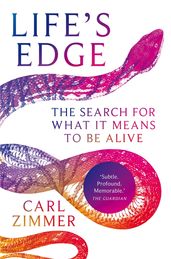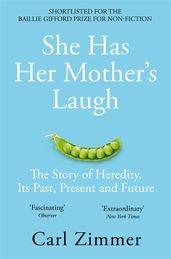Synopsis
SHORTLISTED FOR THE 2018 BAILLIE GIFFORD PRIZE FOR NON-FICTION
She Has Her Mother’s Laugh presents a profoundly original perspective on what we pass along from generation to generation. Charles Darwin played a crucial part in turning heredity into a scientific question, and yet he failed spectacularly to answer it. The birth of genetics in the early 1900s seemed to do precisely that. Gradually, people translated their old notions about heredity into a language of genes. As the technology for studying genes became cheaper, millions of people ordered genetic tests to link themselves to missing parents, to distant ancestors, to ethnic identities . . .
But, award-winning science writer Carl Zimmer argues, heredity isn’t just about genes that pass from parent to child. Heredity continues within our own bodies, as a single cell gives rise to trillions of cells that make up our bodies. We say we inherit genes from our ancestors but we inherit other things that matter as much or more to our lives, from microbes to technologies we use to make life more comfortable. We need a new definition of what heredity is and, through Carl Zimmer’s lucid exposition and storytelling, this resounding tour de force delivers it.
Weaving together historical and current scientific research, his own experience with his two daughters, and the kind of original reporting expected of one of the world’s best science journalists, Zimmer ultimately unpacks urgent bioethical quandaries arising from new biomedical technologies, but also long-standing presumptions about who we really are and what we can pass on to future generations.
Details
Reviews
Beautifully written . . . [A] grand and sweeping book.
Nuanced, entertaining and balances eloquent story-telling with well-researched science . . . Anyone interested in their path through history, and what they may hand on, will find much to excite them.
Fascinating . . . Absorbing . . . Deftly persuasive.
She Has Her Mother’s Laugh is packed full of learning, and years of work . . . The book offers clear insights into a fast-moving area, and asks big questions. Scientists can eradicate diseases, alter DNA and change human heredity. Should they? What could be at stake if they get it wrong?


